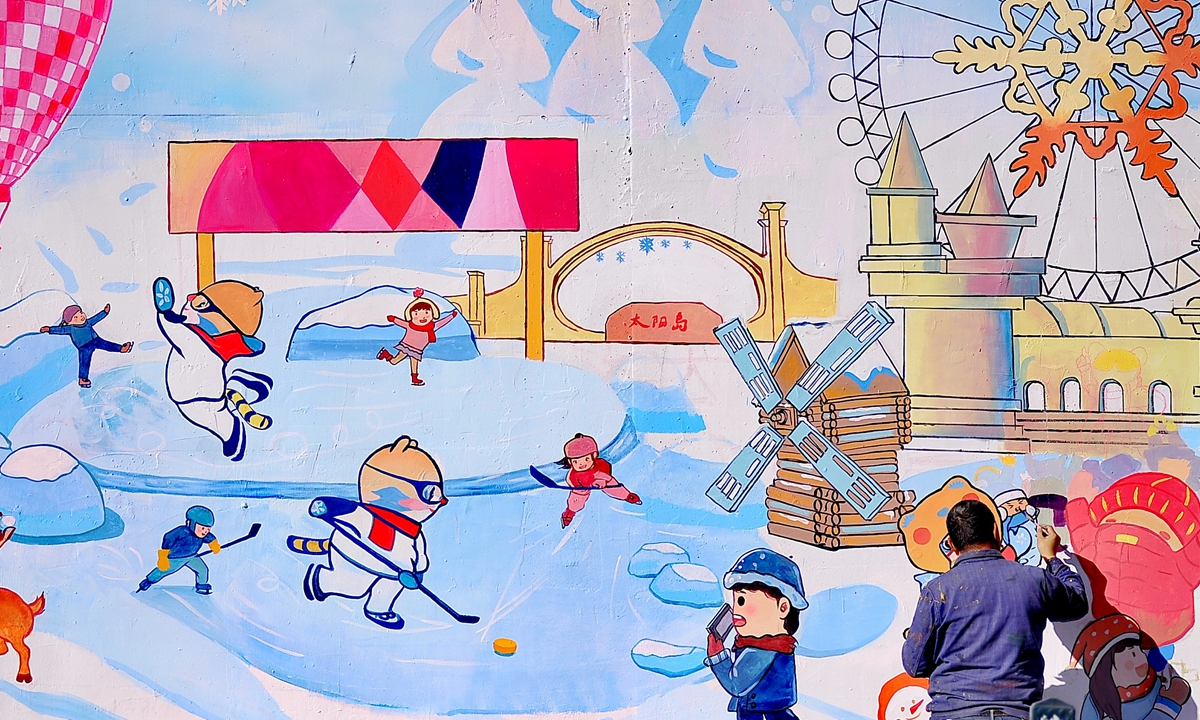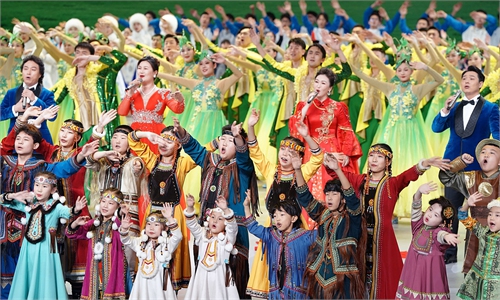
An artist works on a giant mural for the upcoming Asian Winter Games in Harbin, Northeast China's Heilongjiang Province, on November 4, 2024. Harbin is set to host the 9th Asian Winter Games from February 7 to 14 in 2025, marking the city's second time hosting the event since the 1996 edition. Photo: VCG
The opening ceremony of the 2024-25 Yabuli Ski Resort Season and Harbin Ice and Snow Season kicked off on Monday in Harbin, capital of Northeast China's Heilongjiang Province. While Harbin hosts the 9th Asian Winter Games from February 7 to 14 in 2025, eight venues in Yabuli will accommodate snow-based competitions for the Games.
Heilongjiang launched a 100-day winter tourism initiative on Friday, aiming to establish itself as a world-class ice-and-snow tourism destination. According to a press conference held on Friday, Harbin plans to develop over 500 ice and snow sports venues this winter, including sites along the Songhua River, in parks, and on campuses to offer activities like skating, curling, and ice hockey for both locals and tourists. The city will also decorate public spaces with ice and snow sculptures.
The Yabuli Ski Resort has upgraded its facilities for the Games, including ski slopes, hotel accommodations, and public amenities. The resort has also trained its service teams and enhanced service standards to create a better experience for tourists, according to Chinanews.com.
Major events such as the Asian Winter Games and the Olympic Games held in Beijing have helped update and develop the city's infrastructure. This kind of development is, in fact, the best legacy for local residents, Luo Le, a sports scholar at Beijing University of Chemical Technology, told the Global Times.
Nowadays, relying solely on tourist attractions to draw visitors is no longer the most popular approach. People are more interested in diverse travel experiences. A good example is the "Village Super League" competitions, more commonly known as Cunchao, held in Southwest China's Guizhou Province, which attracts people from across the country to watch the competitions, travel around and spend money. Similarly, for Harbin, promoting sports events like ice and snow activities can also boost tourism. By leveraging the branding of sports events and the ice and snow economy, more people will be drawn to visit the city, Luo said.
With the experience gained from hosting major events like the Asian Winter Games, Harbin can make its ice and snow brand more prominent nationwide and even globally, which will make promoting its ice and snow tourism offerings much easier in the future, he added.
"With the approach of the Asian Winter Games, we have made thorough preparations to better welcome tourists. In terms of facility upgrades, we have enhanced our snowmaking on the slopes and constructed an international competition-grade indoor track," Guan Liang, general manager of Harbin Bonski, the city's largest indoor ski venue, told the Global Times.
To better accommodate international tourists, the ski venue has strengthened English and Russian signage and information at key locations. Additionally, the staff have undergone specialized English training to ensure smooth communication and interaction with international guests, added Guan.
Yet they are not the only ones receiving language training. Scenic spots across the city now offer multilingual services, including English and Russian booking interfaces, and improved foreign-language support from staff. Videos of taxi drivers taking English lessons have recently captured public attention on social media. "Good morning. Where to? Get in please," say the drivers in English with a typical Northeast Chinese accent.
"Apart from learning English, I've also picked up some Russian phrases and other foreign languages for simple communication. I hope to learn a few more languages so that I can better welcome foreign tourists and athletes, introducing them to Harbin's unique northeastern China's cuisine, beautiful scenery, and our local customs," Xu Feng, a taxi driver in Harbin, told the Global Times.
Most of the taxi drivers may not have a fancy degree, and learning English can be quite challenging for them. "However, driven by the strong desire to enhance our hometown's image, we have tried every way we could think of, even if it's unorthodox or clumsy. We search on Baidu, look things up on Douyin, and translate each word into Chinese characters to piece them together for pronunciation. We practice during meal breaks or rest time," said Xu. "We've memorized many basic English words, but we still need more practice with sentences. The sentence I'm most fluent in is 'Welcome to China and the Asian Winter Games in Harbin,' because I believe this sentence is appropriate to greet every visitor."
According to local authorities, a new international tourism center on Central Street, a local landmark pedestrian street, offers travel assistance, luggage storage, and attraction information. To facilitate payments for foreign tourists, the province has installed 1,391 POS machines that accept international bank cards and established 70 currency exchange points and ATMs at major hotels and key tourist attractions.



